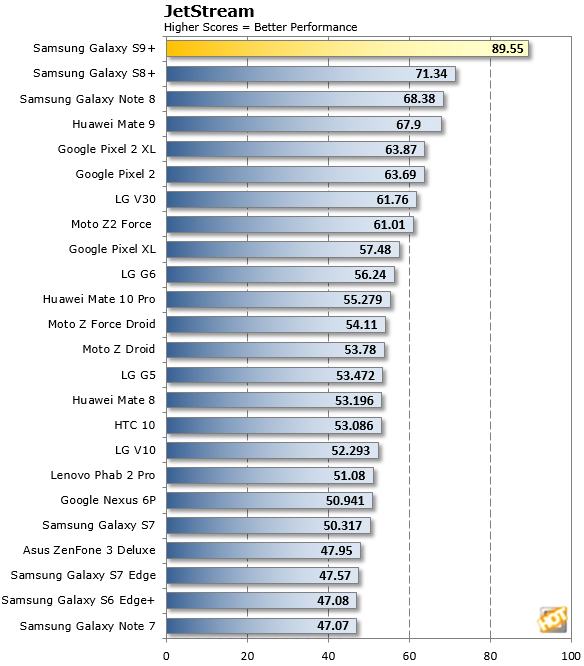Smartphones are increasingly becoming the way many people access the Internet, engage in social networks, and even get business-critical work done. A smartphone needs to have a responsive web browsing system to render complex pages fast, along with a reliable cellular or WiFi connection. We can’t easily, quantitatively measure how well these various radios perform in different phones, as the variables between carriers and access points are too difficult to lock down for reliable test methodology. However, we
can investigate general browser performance between devices.
For our first tests we're using the JetStream benchmark for
Javascript processing, as well as RightWare’s Web Test 3.0, for a comprehensive look at modern web rendering performance, including the latest in
HTML5. Here we're primarily determining how the Samsung Galaxy S9's core CPU architecture (a Qualcomm
Snapdragon 845) handles this workload, along with the Galaxy S9's web browser software stack running Chrome on Android 8.0.
 |
|
JetStream and BrowserMark |
| JavaScript and Browser Testing |
|
Samsug's Galaxy S9+ jumps out of the gate here early with dramatically better performance, likely due in part to its 6GB of RAM configuration backing up its Snapdragon 845 mobile processing platform. In short, versus the previous generation Galaxy S8+, or even Googles bone-stock Android equipped Pixel 2 XL, the Galaxy S9+ is roughly 25 percent faster.
 |
|
AnTuTu 6 |
|
Platform Benchmarks |
|
AnTuTu’s latest benchmark (now updated results here with version 7) returns a number of metrics ranked with somewhat nebulous scores, rather than frame rates or time to complete. Scrambling to hit Samsung's embargo lift, we're short on a few competitive devices here. We hope to add to this in the future though we do have some top Android handsets for reference. Regardless, AnTuTu returns four top level performance metric results that we are including below: CPU, RAM, 3D, UX (or User Experience), along with a total score. Since this is an Android benchmark, we don't have Apple products to show in the mix here.

More of the same here for Samsung's new Galaxy S9+. The new Galaxy S device holds a commanding lead over its older generation competitors powered by Snapdragon 835 and Huawei's HiSilicon Kirin 970. Again, 6 Gigs of RAM and the Snapdragon 845 prove potent.
 |
|
Geekbench |
|
Synthetic CPU Testing |
|
In the GeekBench test, we're stressing only CPU cores in a handset (not graphics or GPU architecture), with both single and multi-threaded workloads. The tests are comprised of encryption processing, image compression, HTML5 parsing, physics calculations and other general purpose compute mobile processing workloads.

What's the fastest Android super-phone on the market currently? Answer: Samsung's Galaxy S9+. However, Apple's A11 Bionic in the iPhone X still dominates from a raw CPU throughput perspective, with its tight coupling of operating system and silicon architecture development showing strong in blistering single core performance especially.
 |
|
Futuremark PCMark For Android |
|
General Purpose Pocket Computing Performance Metrics |
|
Futuremark's PCMark for Android is a new benchmark addition here for us, so again we have fewer results in our database of tested phones to show you. However, this is an excellent suite of tests that we recommend for benchmarking performance of a handset with heavier-duty tasks for things like image manipulation and video editing, as well as lighter-duty workloads like email, and web browsing. When you see the test running live it's clear its scripted application tests are carefully selected and tuned to make use of the platforms involved in a very controlled way.

Here it's another win for the Galaxy S9+, though not quite as definitive, with
Google's Pixel 2 XL and Pixel 2 pulling out an edge win in the Video Editing test. Regardless, the Galaxy S9+ still performs admirably.
AnTuTu’s latest benchmark returns a number of metrics ranked with nebulous scores, rather than frame rates or time to complete. We tested with the latest version of AnTuTu across all platforms including Android, iOS and even Windows Phone. AnTuTu returns four top level performance metric results that we are including here: CPU, RAM, 3D, UX (or User Experience), along with a total score.













